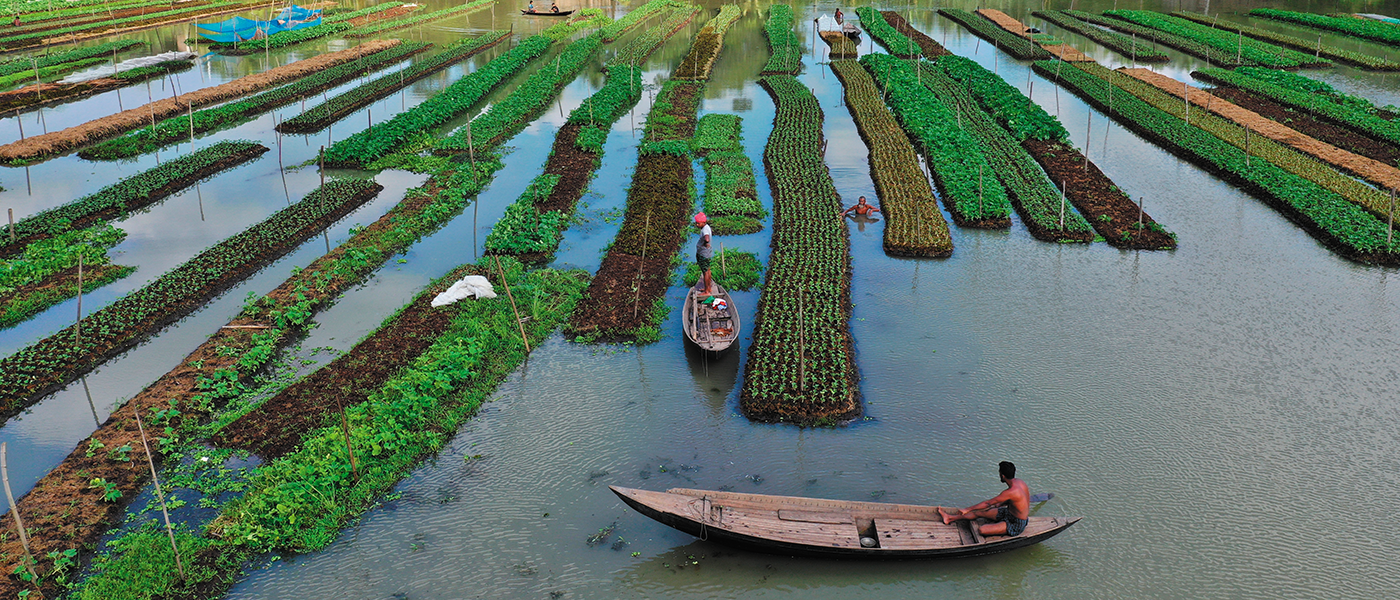UN SDG 6: Clean water and sanitation
Ensure availability and sustainable management of water and sanitation for all
Our research

An international study led by the University of Glasgow is the first to define a safe operating space for major rivers in the Bangladesh Delta, which will enhance resilience in one of the world’s most vulnerable deltas to global climate change.
Researchers at Glasgow, Bangladesh University of Professionals and Bangabandhu Sheikh Mujibur Rahman Agricultural University and Riverine People, found that four out of ten rivers in the Bangladesh Delta exceeded the safe operating space and that the majority of river flow has been significantly altered, with the remaining six rivers given cautious status.
The study shares valuable scientific evidence that will inform science and policy related to transboundary water, and contribute to the achievement of Sustainable Development Goals in Bangladesh and South Asia
Professor of Environmental Engineering, William Sloan, and his team are working on a solution to enable those in rural communities to improve water security and benefit from sustainable off-grid technologies to deliver clean water and sanitation.
Some 35% of the world’s population, most of whom live in rural communities, lack access to either safe drinking water or improved sanitation. The team will harness the bioprocessing power of microorganisms, where microbes consume the pollutants in water and break them down into less harmful products, to deliver clean drinking water and treat wastewater in rural communities using low-energy, sustainable, off-grid technologies. Working together with Scottish Water to improve water security, these communities include the islands of Barra, Jura and Arran; rural communities in Thailand, Mexico and Brazil have also been identified.

An international study will enhance resilience in the Bangladesh Delta, one of the world’s most vulnerable deltas to global climate change.
Learning & teaching

Environmental geoscience is the study of the interaction between natural and anthropogenic processes and environments. It focuses on working towards a sustainable future by understanding how humans affect, and are affected by, a range of environmental issues including climate change, water resources, pollution and landscape change. Our Environmental Geoscience programme prepares students to pursue a variety of careers including environmental consultancy, engineering and water management, and renewable energy development and implementation.
The programme covers fundamental environmental geoscience principles, including the evolution of life, surface processes and environments, the sustainable exploration for resources and energy, climate change, water security and waste and contaminated land management. These principles are supported by the understanding of geological concepts such as plate tectonics, the structure of the Earth, volcanoes, earthquakes, how rocks deform and the evolution of the oceans and continents. Students develop a range of spatial, analytical and computational skills.
Find out more
University operations

The rain gardens on University Place, planting beds in St Mungo Square and the main rain gardens below the Square are designed to catch and attenuate surface water runoff (carrying pollutants such as salt, hydrocarbons from asphalt and any spilt materials). The planting includes species capable of cleaning surface water runoff (eg reeds, rushes and marginals) and the check dams within the rain gardens slow the rate at which surface water passes through the planting, enabling the settlement of pollutants and silt within the beds.
We have also promoted water consciousness through the installation of 50 sustainable water fountains on campus. The fountains are not chilled and are run on the domestic water supply, while de-incentivising the purchase of single-use plastic bottles and cups by providing ample access to water on campus.
Find out more
Civic engagement

Our School of Social & Environmental Sustainability based at our Dumfries campus has been playing important roles in implementing SDGs on water, both nationally and internationally. It now has a well-established global webinar series on water & sustainable development. This series provides a platform for discussion on current- and future-related water problems, and potential solutions from a multidisciplinary, multi-sectoral and multi-issues viewpoint. Leading global academics, senior policymakers from around the world and heads of national and international organisations are contributing their views and perspectives.
Running this series of webinars has been Cecilia Tortajada, Professor in Practice – Environmental Innovation, and Asit K Biswas, Distinguished Visiting Professor at Glasgow. The series has focused on a diverse range of topics, including water security in transboundary and interstate rivers, Scotland’s water future and the treatment and reuse of wastewater.
Professors Tortajada and Biswas are advising several countries to reach their SDG 6 targets. At the invitation of the CEO of NITI Aayog, Professor Biswas outlined the path India could take to ensure water security for India’s Vision 2047, a major objective of the Indian Government.



















